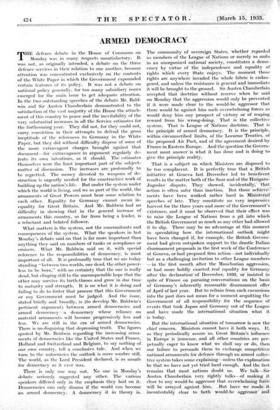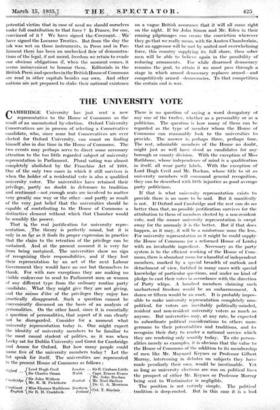ARMED DEMOCRACY
THE defence debate in the House of Commons on Monday was in many respects unsatisfactory. It was not, as originally intended, a debate on the three defence services in their relation to one another, because attention was concentrated exclusively on the contents of the White Paper in which the ,Government expounded certain features of its policy. It was not a debate on national policy generally, for too mink subsidiary issues emerged for the main issue to get adequate attention. In the two outstanding speeches of the debate Mr. Bald- win and Sir Austen Chamberlain demonstrated to the satisfaction of the vast majority of-the House the attach- ment of this country to peace and the inevitability of the very substantial increases in all the Service estimates for the forthcoming year. They did not, for they could not, carry conviction in their attempts to defend the gross ineptitude of the references to Germany in the White Paper, but they did without difficulty dispose of some of the more extravagant charges brought against that document—for extravagance in argument regularly de- feats its own intentions, as it should. The estimates themselves were the least important part of the subject- matter of discussion. The increases are profoundly to be regretted. The money devoted to weapons of de- struction is urgently needed for the constructive work of building up the nation's life. But under the system under which the world is living, and we as part of the world, the armaments of Great Powers must bear some relation to each other. Equality for Germany cannot mean in- equality for Great Britain. And Mr. Baldwin had no difficulty in showing that in the general increase of armaments this country, so far from being a leader, is a reluctant and belated follower. .
What matters is the system, not the concomitants and consequences of the system. What the speakers in last Monday's debate said on that is far more important than anything they said on numbers of tanks or aeroplanes or cruisers. What Mr. Baldwin said on it, with special reference to the responsibilities of democracy, is most important of all. It is profoundly true that we are today standing "between two worlds, one dead, the other power- less. to be born," with no certainty that the one is really dead, but clinging still to the unconquerable hope that the other may survive its birth-throes and grow in due time to maturity and strength. It -is on what it is doing and failing to do to foster that process that this Government or any Government must be judged. And the issue, stated briefly and broadly, is (to develop Mr. Baldwin's pertinent argument) between armed democracies and armed democracy—a democracy whose reliance on material armaments will become progressively -less and less. We are still in the era of armed democracies. There is no disguising that depressing truth. The figures quoted by Mr. Baldwin regarding the increasing arma- ments of democracies like the United States and France, Holland and Switzerland and Belgium, to say nothing of our own country, tell a conclusive tale. And when we turn to the autocracies the outlook is more sombre still. The world, as the Lord President declared, is as unsafe for democracy as it ever was.
There is only one way out. No one in Monday's debate seriously suggested any other. The various speakers differed only in the emphasis - they laid -on it. Democracies can only disarm if the world can become an armed democracy. A democracy it in- theory is. • The community of sovereign States, whether. regarded as members of the League of Nations or merely as units in an unorganized national society, constitutes a demo- cracy by virtue of the independence and equality of rights which every State enjoys. The moment those rights are anywhere invaded the whole fabric is endan- gered, and unless- the resiStance is general and immediate it will be brought to the ground. Sir Austen -Chamberlain accepted that doctrine without reserve when he said on Monday that the aggression would only be prevented if it were made clear to the would-be aggressor that there would be against him such overwhelming forces as would deny him any prospect of victory or of reaping reward from his wrong-doing. That is the collective system. That is League of Nations doctrine. That is the principle of armed democracy. It is the principle, within circumscribed limits, of the Locarno Treaties, of the proposed Air Pact, and of the agreement desired by France in Eastern Europe. And the question the GoVern- ment must answer is what it has done and is doing to give the principle reality.
That is a subject on which Ministers are disposed to be too complacent. It is perfectly true that a British initiative at Geneva last December led to benefieent results in the matter both of the Saar and of the Hungaro- Jugoslav dispute. They showed, incidentally; that action is often safer than inaction. But those achieve- ments have been worked rather hard in Ministerial speeches of late. They constitute no very impressive harvest for the three years and more of the Government's existence, and it must be observed that their effect was to raise the League of Nations from a pit into which the British Government as much as any other had allowed it to slip. There may be no advantage at this moment in speculating how• the international outlook might have been changed if, for example, the British Govern- ment had given outspoken support to the drastic Italian disarmament proposals in the first week of the Conference at Geneva, or had proposed firm action—not individually but as a challenging invitation to other League members —in the first month after the Manchurian aggression, or had more boldly exacted real equality for Germany after the declaration-of December, 1932, or insisted in spite of France on pursuing conversations on the basis of Germany's inherently reasonable 'disarmament offer of April of last year. But to refrain from such excursions into the past does not mean for a moment acquitting the Government of all responsibility for the sequence. Of events that took Japan and Germany out of the League and have made the international situation what it -- is today.
But the international situation of tomorrow is now the chief cancem. Ministers cannot have it both ways. If, as they periodically assure us, Great Britain's influence in Europe is immense, and all other countries are per- petually eager to know what. we shall say or do, then our failure to persuade them to exchange competitive national armaments for defence through an armed collec- tive system takes some explaining—unless the explanation be that we have not yet tried hard enough. And the fact remains that most nations doubt us. We - talk—Sir - Austen Chamberlain very rightly talks—of making it clear to any would-be aggressor that overwhelming foie will be arrayed against him. But have we made it incontestably clear to both would-be aggressor and' potential victim • that in case of need we should ourselves make full contribution to that force ? Is France, for one, convinced of it ? We have signed thereavenafit..:; We' have signed the Locarno Treaties. But from the day the ink was wet on those instruments, in Press and in Parr liament there has been an unchecked flow of demonstra- tions of the legal, if not moral, freedom we retain to evade our obvious obligations if When the moment conies, it seems inConvenient. to honour them. ,Editorials in the British Press and speeches in the British House of Commons are read. in ;Other capitals besides our oWn. And other nations are not prepared to stake their national existence on a vague British assurance that it will all come right on the night. If Sir John Simon and _Mr. Eden in their coming pilgrimages can create the conviction wherever they go that we really mean, with Sir Austen Chamberlain; that an aggressor will be met by united and overwhelming force, this Country supplying its -full share, then sober men will be able to believe again in the possibility of reducing armaments. For while disarmed democracy remains the goal, to attain it we must pass through a stage in which armed democracy replaces • armed—and competitively armed—democracies. To that competition the certain end is war.











































 Previous page
Previous page